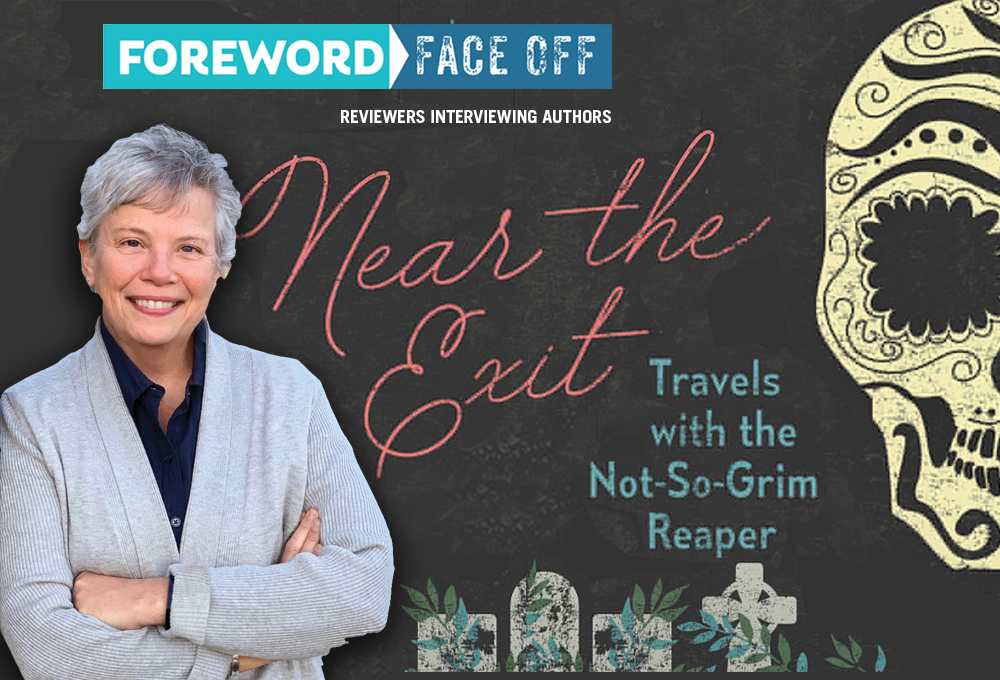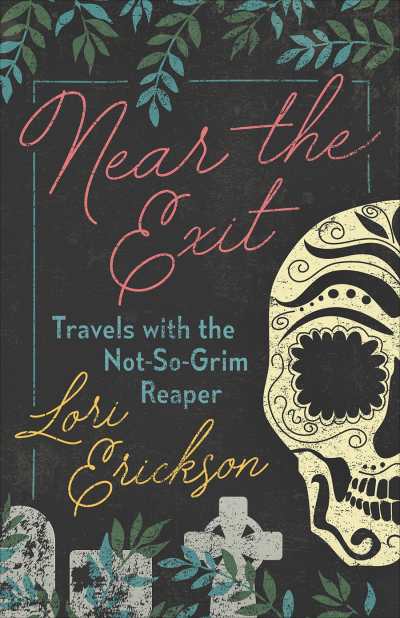Reviewer Katie Asher Interviews Lori Erickson, Author of Near the Exit: Travels with the Not-So-Grim Reaper

Everything dies, as we learn at a young age. Right up until the day we die ourselves, death happens constantly around us. Insects and songbirds smashed against windshields, worms and caterpillars smushed on sidewalks, gang violence on the nightly news, grandfathers keeling over from heart attacks, and on and on. Death is so common as to be trite.
But the mood sure changes if we dare to talk about our own death. Only a few of us seem to have the levity to discuss end-of-life matters frankly and with composure. If you’re among the squeamish, this week’s interview is for you.

Meet Lori Erickson, an Episcopal deacon and death-phobia defier. Lori’s the author of Near the Exit, a sublime exploration of how we all can face our own demise with grace and humor.
Katie Asher reviewed the book in the July/August issue of Foreword Reviews and we quickly recognized the makings of a fascinating conversation. Thanks to the good people at Westminster John Knox for helping us get Lori and Katie together.
Katie, take it from here.
I recently read a quote from Neil deGrasse Tyson that said “I would request that my body in death be buried not cremated, so that the energy content contained within it gets returned to the earth, so that flora and fauna can dine upon it, just as I have dined upon flora and fauna during my lifetime.” I have always held the notion that I would like to be cremated, until I read this quote and it rang so true for me. Does this change your perspective on burial vs. cremation?
That’s a great quote. It reminds me of a comment made by a Mexican shaman in my book. He told me that we all owe Mother Earth our body after we die in exchange for all we’ve taken from her. This makes intuitive sense to me. On the other hand, cremation is easy to arrange and relatively inexpensive. And green burial sites—where the bodies aren’t embalmed and are buried in biodegradable containers—aren’t that common. My hometown is hoping to start one, and if they do, I might sign up for a plot. But for now, I plan to go up in smoke.
But in the end, I don’t really care what happens to my body. I think at the end of my life it will be like a worn-out set of clothes that gets taken to a second-hand shop after you’re done using them. You hope some good might come of them, but they’ve already served their main purpose.
Do you feel that the people around you reacted strangely when you first started discussing death in such a unique way? Do you think that you have had an impact on the people closest to you, and their relationships with death now as well?
I think people expect authors to be a little strange, so when I was writing my book on death and travel I don’t think my friends and family thought I was any weirder than usual. Also, my husband is a philosophy professor (he’s now retired, but once a philosopher, always a philosopher) and so for us, sitting around talking about death is just another ordinary evening at home.
That said, my questions to people about death opened up some very interesting conversations. Once you start talking about mortality, you quickly go deeper than superficial chitchat. People told me about their losses and personal tragedies and their fears for the future. Almost everyone had a story and was eager to talk. At dinner parties, especially, I’ve found that throwing the topic of death into the middle of the table launches some memorable exchanges of beliefs and experiences.
That’s one of the reasons why I wanted to write this book, in fact: to help normalize conversations about death. Love and death are the two biggest human preoccupations, after all. It’s a lot more fun to talk about love, but mortality opens up even richer veins of conversation and reflection.
Too often, though, we hesitate to talk about death because people view it as depressing or in bad taste. But this is gradually changing, thanks in part to a growing number of books, films, and programs like Death Cafes (where people get together to talk about mortality). As Baby Boomers age, I think we’re going to see a re-examination of many aspects of end-of-life issues. We’re Baby Boomers, after all, and we’re used to believing the entire world revolves around us. So expect more books like mine until the last of us have breathed our last.
How are people’s reactions to your religious fluidity, specifically members of the church? Have you gotten flack for being selective on what you believe in, even if it doesn’t necessarily line up with your designated religion?
Religion is endlessly fascinating to me, and one of the things I most enjoy about my work is the chance to explore other faiths. Huston Smith, the great scholar of the world’s religions, once said that Christianity had always been his central meal, but he was a great believer in vitamin supplements. I love that! Like him, I’ve found my faith is made stronger, not weaker, by learning from other traditions.
Also, I’m an Episcopalian, which is a pretty open-minded denomination, and so my religious fluidity hasn’t made a lot of waves. And if people don’t approve of what I’m doing, I’ve found it helpful to just smile and say, “You might be right.” Growing up in a small Midwestern town, I learned early on that a little passive-aggressive politeness can be enormously useful.
I am currently reading The Tibetan Book of Living and Dying, a follow up to the book The Tibetan Book of the Dead. The book discusses the importance of integrating death into life, and how to have a relationship with it. Why did you decide to write about death? What was the main goal of this story, of this book?
Writing my book was partly a way to deal with my sense of loss after my brother’s death and mother’s dementia. It wasn’t therapy, exactly, but learning about how other cultures have viewed mortality was both interesting and comforting to me. I think it helps to know that many other people have walked this way before you and have struggled with similar issues. And I’ve always looked to travel for inspiration, and so it seemed natural to seek out places that taught me something about death, from the Valley of the Kings in Egypt to Crestone, Colorado, which has the nation’s only non-denominational, open-air cremation site.
But even before those losses, I’ve long been fascinated by death and what comes after it. I have a fondness for ghost stories, for example, and for accounts of the peculiar ways people have died (falling from a cliff while peeing off the side of the Grand Canyon, for example, which apparently happens more than you might expect).
I hope my book contributes to a growing national conversation about mortality. The success of books like Atul Gawande’s Being Mortal shows that many people want to face death with greater honesty and openness.
I must admit to feeling a little inadequate in taking on such a big subject, one that’s been well plumbed by people much wiser than me. But I believe my approach to the topic is unusual in that it blends travel and death, and I hope I shed some fresh light on perennial truths. I also think that it’s part of our birthright to wonder about mortality—you don’t need a theological degree, just human DNA. So Near the Exit is my addition to the endless speculations about this great mystery.
If you could abandon all previous knowledge and context, and choose a culture and/or religion based solely on its guidelines and theology, what would you choose, and why?
This question really stumped me. After thinking about it for some time, I’d choose not just one, but instead a blend of several traditions, though of course that’s just the sort of squishy theology that question #3 refers to. I’d put together an amalgam of Christianity and Buddhism with some nature mysticism thrown in. I’d love to live in a compound with Jesus and Buddha next door, and every Saturday evening we’d get together for a service with incense and bells and chant, and then we’d have a big party with wonderful food and invite everyone in who needed a meal. We’d spend the next day meditating in silence. And every year we’d do at least one wilderness trek where we’d commune with bears.
What is your opinion on the way we choose to house our elderly in this country, and for the most part, in the West, and what, if anything, would you do to change it?
I think we’re making progress in this area but we still have a long way to go. I know that I’m very grateful to the nursing home where my mother lives. They provide compassionate, skilled care for her that I simply couldn’t do on my own. But dementia care is in its own special category of difficulty, and for most elderly people, staying out of a nursing home is a good thing.
I like some of the new models that are being developed, which include co-housing and facilities that integrate day care centers with housing for older people. As for myself, I hope that when I’m in my last years I can live in one of those cute little grandmother houses next to one of my sons. They’ve yet to agree to this, however, even though they’ve both read my book and have had plenty of time to say, “Mom, I’d love to have you live next door to me when you’re old.”
Katie Asher
